| Listing 1 - 9 of 9 |
Sort by
|
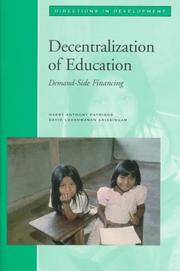
ISBN: 0821339303 Year: 1997 Publisher: Washington (D.C.): World Bank
Abstract | Keywords | Export | Availability | Bookmark
 Loading...
Loading...Choose an application
- Reference Manager
- EndNote
- RefWorks (Direct export to RefWorks)
Educational vouchers --- Education --- Federal aid to education --- #A9903A --- Federal grants for education --- Education vouchers --- School vouchers --- Vouchers, Educational --- Finance --- Federal aid --- Law and legislation --- Objectives of teaching --- Developing countries
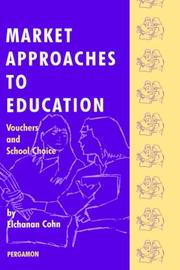
ISBN: 0080425674 9780080425672 Year: 1997 Publisher: Oxford Pergamon
Abstract | Keywords | Export | Availability | Bookmark
 Loading...
Loading...Choose an application
- Reference Manager
- EndNote
- RefWorks (Direct export to RefWorks)
Educational vouchers --- School choice --- Bons scolaires --- Ecoles --- Choix --- #SBIB:316.334.1O220 --- Choice of school --- Parents' choice of school --- School, Choice of --- Schools --- Education --- Education vouchers --- School vouchers --- Vouchers, Educational --- Organisatie van het onderwijs: algemeen --- Selection --- Finance --- Educational vouchers. --- School choice. --- Historische en vergelijkende pedagogiek --- Historische en vergelijkende pedagogiek.
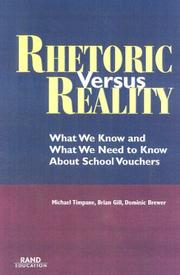
ISBN: 0833027654 0833032550 0585418381 9780585418384 9780833032553 9780833027658 Year: 2000 Publisher: Santa Monica : RAND Corporation,
Abstract | Keywords | Export | Availability | Bookmark
 Loading...
Loading...Choose an application
- Reference Manager
- EndNote
- RefWorks (Direct export to RefWorks)
The authors examine the evidence on vouchers in education. They consider how vouchers would affect the academic achievement of participating and non-participating students, which students might use vouchers, who would supply and regulate schooling, and how much a voucher system would cost.
Charter schools. --- Educational vouchers. --- School choice. --- Educational vouchers --- Charter schools --- Chartered schools --- Education vouchers --- School vouchers --- Vouchers, Educational --- School choice --- Theory & Practice of Education --- Education --- Social Sciences --- Choice of school --- Parents' choice of school --- School, Choice of --- Schools --- Grant-maintained schools --- Privatization in education --- Selection --- Finance
Book
ISBN: 1282154206 9786612154201 0821379771 0821379763 Year: 2009 Publisher: Washington DC : World Bank/IBRD,
Abstract | Keywords | Export | Availability | Bookmark
 Loading...
Loading...Choose an application
- Reference Manager
- EndNote
- RefWorks (Direct export to RefWorks)
While public-private partnerships in education in the United States have received a lot of attention, research on such partnerships elsewhere has been limited-even though such partnerships have been steadily gaining prominence, particularly in developing countries. Aiming to fill this gap, this book presents fresh, technically sound empirical evidence on the effectiveness and cost of various public-private education partnerships from around the world, including voucher programs and faith-based schools.The evidence on the impact in terms of school performance, targeting, and cost of public-priv
Educational vouchers --- Privatization in education --- Church schools --- Christian schools --- Denominational schools --- Diocesan schools --- Faith-based schools (Church schools) --- Parish schools --- Parochial schools --- Schools, Denominational --- Schools, Parochial --- Privatization of education --- Privatization of schooling --- School privatization --- Education vouchers --- School vouchers --- Vouchers, Educational --- Church and education --- Private schools --- Education --- Charter schools --- Finance
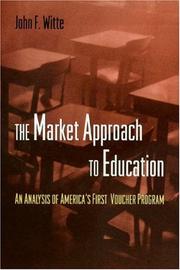
ISBN: 1282753878 9786612753879 1400823315 1400813875 9781400823314 9781400813872 0691009449 9780691009445 9781282753877 0691089833 9780691089836 Year: 2000 Publisher: Princeton, N.J. : Princeton University Press,
Abstract | Keywords | Export | Availability | Bookmark
 Loading...
Loading...Choose an application
- Reference Manager
- EndNote
- RefWorks (Direct export to RefWorks)
Milwaukee, one of the nation's most segregated metropolitan areas, implemented in 1990 a school choice program aimed at improving the education of inner-city children by enabling them to attend a selection of private schools. The results of this experiment, however, have been overshadowed by the explosion of emotional debate it provoked nationwide. In this book, John Witte provides a broad yet detailed framework for understanding the Milwaukee experiment and its implications for the market approach to American education. In a society supposedly devoted to equality of opportunity, the concept of school choice or voucher programs raises deep issues about liberty versus equality, government versus market, and about our commitment to free and universal education. Witte brings a balanced perspective to the picture by demonstrating why it is wrongheaded to be pro- or anti-school choice in the abstract. He explains why the voucher program seems to be working in the specific case of Milwaukee, but warns that such programs would not necessarily promote equal education--and most likely harm the poor--if applied universally, across the socioeconomic spectrum. The book begins with a theoretical discussion of the provision of education in America. It goes on to situate the issue of school choice historically and politically, to describe the program and private schools in Milwaukee, and to provide statistical analyses of the outcomes for children and their parents in the experiment. Witte concludes with some persuasive arguments about the importance of specifying the structural details of any choice program and with a call supporting vouchers for poor inner-city children, but not a universal program for all private schools. Voucher programs continue to be the most controversial approach to educational reform. The Market Approach to Education provides a thorough review of where the choice debate stands through 1998. It not only includes the "Milwaukee story" but also provides an analysis of the role, history, and politics of court decisions in this most important First Amendment area.
Education, Urban --- School choice --- Educational vouchers --- Inner city education --- Urban education --- Cities and towns --- Urban policy --- Choice of school --- Parents' choice of school --- School, Choice of --- Schools --- Education --- Education vouchers --- School vouchers --- Vouchers, Educational --- Selection --- Finance --- #SBIB:002.IO --- #SBIB:35H42 --- #SBIB:35H433 --- Beleidsinstrumenten --- Beleidssectoren: onderwijs- en onderzoeksbeleid
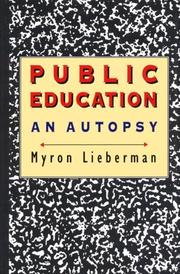
ISBN: 0674722329 9780674722323 Year: 1994 Publisher: Cambridge (Mass.) Harvard university press
Abstract | Keywords | Export | Availability | Bookmark
 Loading...
Loading...Choose an application
- Reference Manager
- EndNote
- RefWorks (Direct export to RefWorks)
Educational vouchers --- -Vouchers in education --- -School, Choice of --- -Educational vouchers --- -School choice --- -Choice of school --- Education vouchers --- School vouchers --- Vouchers, Educational --- Common schools --- Grammar schools --- School funds --- -Selection --- -Public schools --- Public schools --- Education --- Privatization --- School choice --- School improvement programs --- Economic aspects --- Public schools - United States --- Education - Economic aspects - United States --- Privatization - United States --- Educational vouchers - United States --- School choice - United States --- School improvement programs - United States
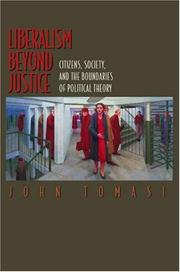
ISBN: 0691049696 Year: 2021 Publisher: Princeton, NJ : Princeton University Press,
Abstract | Keywords | Export | Availability | Bookmark
 Loading...
Loading...Choose an application
- Reference Manager
- EndNote
- RefWorks (Direct export to RefWorks)
Liberal regimes shape the ethical outlooks of their citizens, relentlessly influencing their most personal commitments over time. On such issues as abortion, homosexuality, and women's rights, many religious Americans feel pulled between their personal beliefs and their need, as good citizens, to support individual rights. These circumstances, argues John Tomasi, raise new and pressing questions: Is liberalism as successful as it hopes in avoiding the imposition of a single ethical doctrine on all of society? If liberals cannot prevent the spillover of public values into nonpublic domains, how accommodating of diversity can a liberal regime actually be? To what degree can a liberal society be a home even to the people whose viewpoints it was formally designed to include? To meet these questions, Tomasi argues, the boundaries of political liberal theorizing must be redrawn. Political liberalism involves more than an account of justified state coercion and the norms of democratic deliberation. Political liberalism also implies a distinctive account of nonpublic social life, one in which successful human lives must be built across the interface of personal and public values. Tomasi proposes a theory of liberal nonpublic life. To live up to their own deepest commitments to toleration and mutual respect, liberals, he insists, must now rethink their conceptions of social justice, civic education, and citizenship itself. The result is a fresh look at liberal theory and what it means for a liberal society to function well.
Liberalism. --- Social justice. --- Liberalism --- Social justice --- Liberal egalitarianism --- Equality --- Justice --- Liberty --- Political science --- Social sciences --- POLITICAL SCIENCE / History & Theory. --- Aristotle: and civic humanism. --- Berlin, Isaiah. --- Brighouse, Harry. --- Buchanan, James. --- Burke, Edmund. --- Commercial Club of Chicago. --- Dilsworth-Anderson, Peggye. --- Dodge, William. --- Dworkin, Ronald. --- Estlund, David. --- Flathman, Richard. --- Franklin, Benjamin. --- French Revolution. --- Friedman, Milton. --- Gilligan, Carol. --- Glendon, Mary Ann. --- Griffin, Leslie. --- Hayek, Friedrich. --- Hibben, John. --- High Middle Ages. --- John Paul II. --- Kant. --- Kegan, Robert. --- Kymlicka, Will. --- Levinson, Meira. --- Machiavelli. --- Mill, John Stuart. --- Munshi, Sherally. --- Nord, Warren. --- Okin, Susan Moller. --- Orwin, Clifford. --- Piaget. --- Rand, Ayn. --- Raz, Joseph. --- Tax-flattening principle. --- Thompson, Dennis. --- alphabet people: descriptions. --- burdens of judgment. --- citizenship: derivative interpretation. --- coextensivity assumption. --- compassionate conservatism. --- constructivism, political. --- free erosion: defined. --- liberal nonpublic reason. --- liberal proviso. --- moral powers. --- neutrality of aim. --- res publica Christiana. --- school vouchers. --- self-respect. --- tzedakah. --- utilitarianism.
Book
Year: 2015 Publisher: Washington, D.C. : The World Bank,
Abstract | Keywords | Export | Availability | Bookmark
 Loading...
Loading...Choose an application
- Reference Manager
- EndNote
- RefWorks (Direct export to RefWorks)
Parents and students from different socioeconomic backgrounds value differently school characteristics, but the reasons behind this preference heterogeneity are not well understood. In the context of the centralized school assignment system in Mexico City, this study analyzes how a large household income shock affects choices over high school tracks exploiting the discontinuity in the assignment of the welfare program Oportunidades. The income shock significantly increases the probability of choosing the vocational track vis-a-vis the other more academic-oriented tracks. The findings suggest that the transfer relaxes the financial constraints that prevent relatively low-ability students from choosing the schooling option with higher labor market returns.
Academic ability --- Academic achievement --- Academic quality --- Academic year --- Access to university --- Achievement --- Achievement standards --- Assignment mechanism --- Average treatment effect --- Career --- College --- College education --- Curriculum --- Dropout rate --- Economic development --- Economics of education --- Education --- Education for all --- Education institutions --- Education level --- Education programs --- Educational modalities --- Educational outcomes --- Effective schools & teachers --- Elite schools --- Employment --- Enrollment --- Ethnic composition --- Exam --- Fees --- Geographic distribution --- Grade levels --- Graduate --- Graduation rate --- Grants --- High school --- High school level --- High school students --- High schools --- Higher education --- Human capital --- Information technology --- ITS --- Labor markets --- Learning --- LET --- Literature --- Low-income students --- Lower secondary --- Lower secondary school --- Middle school --- Middle schools --- Ministry of education --- Mobility --- Number of students --- Number of students per teacher --- Open access --- Parental education --- Pedagogical methods --- Primary education --- Public education --- Public school --- Public schools --- Returns to education --- Scholarships --- School attendance --- School census --- School completion --- School curriculum --- School days --- School facilities --- School infrastructure --- School level --- School principals --- School program --- School programs --- School quality --- School students --- School supplies --- School vouchers --- School year --- Schooling --- Secondary education --- Secondary enrollment --- Secondary school --- Secondary schooling --- Skills --- Statistics --- Student ability --- Students --- Students per teacher --- Study --- Teacher --- Teachers --- Technical education --- Technical schools --- Technical track --- Tertiary education --- Tertiary level --- Test scores --- Training --- Tuition --- Tuition costs --- Tuition fees --- University --- University degree --- University programs --- Upper secondary --- Upper secondary education --- Upper secondary level --- Vocational education --- Vocational school --- Vocational schools --- Vouchers --- Workshops
Book
Year: 2015 Publisher: Washington, D.C. : The World Bank,
Abstract | Keywords | Export | Availability | Bookmark
 Loading...
Loading...Choose an application
- Reference Manager
- EndNote
- RefWorks (Direct export to RefWorks)
Parents and students from different socioeconomic backgrounds value differently school characteristics, but the reasons behind this preference heterogeneity are not well understood. In the context of the centralized school assignment system in Mexico City, this study analyzes how a large household income shock affects choices over high school tracks exploiting the discontinuity in the assignment of the welfare program Oportunidades. The income shock significantly increases the probability of choosing the vocational track vis-a-vis the other more academic-oriented tracks. The findings suggest that the transfer relaxes the financial constraints that prevent relatively low-ability students from choosing the schooling option with higher labor market returns.
Academic ability --- Academic achievement --- Academic quality --- Academic year --- Access to university --- Achievement --- Achievement standards --- Assignment mechanism --- Average treatment effect --- Career --- College --- College education --- Curriculum --- Dropout rate --- Economic development --- Economics of education --- Education --- Education for all --- Education institutions --- Education level --- Education programs --- Educational modalities --- Educational outcomes --- Effective schools & teachers --- Elite schools --- Employment --- Enrollment --- Ethnic composition --- Exam --- Fees --- Geographic distribution --- Grade levels --- Graduate --- Graduation rate --- Grants --- High school --- High school level --- High school students --- High schools --- Higher education --- Human capital --- Information technology --- ITS --- Labor markets --- Learning --- LET --- Literature --- Low-income students --- Lower secondary --- Lower secondary school --- Middle school --- Middle schools --- Ministry of education --- Mobility --- Number of students --- Number of students per teacher --- Open access --- Parental education --- Pedagogical methods --- Primary education --- Public education --- Public school --- Public schools --- Returns to education --- Scholarships --- School attendance --- School census --- School completion --- School curriculum --- School days --- School facilities --- School infrastructure --- School level --- School principals --- School program --- School programs --- School quality --- School students --- School supplies --- School vouchers --- School year --- Schooling --- Secondary education --- Secondary enrollment --- Secondary school --- Secondary schooling --- Skills --- Statistics --- Student ability --- Students --- Students per teacher --- Study --- Teacher --- Teachers --- Technical education --- Technical schools --- Technical track --- Tertiary education --- Tertiary level --- Test scores --- Training --- Tuition --- Tuition costs --- Tuition fees --- University --- University degree --- University programs --- Upper secondary --- Upper secondary education --- Upper secondary level --- Vocational education --- Vocational school --- Vocational schools --- Vouchers --- Workshops
| Listing 1 - 9 of 9 |
Sort by
|

 Search
Search Feedback
Feedback About UniCat
About UniCat  Help
Help News
News